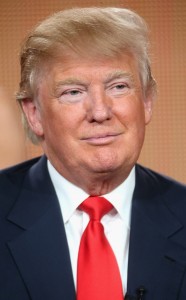
Donald Trump sealed his extraordinary march to the Republican presidential nomination with a victory in the Indiana primary. Now he faces what may be an even tougher challenge: persuading the Republican Party to coalesce behind his candidacy.
Trump won a landslide victory over Texas Senator Ted Cruz, though he’s still almost 200 votes shy of the 1,237 necessary for the nomination. Cruz’s last real hope was to win a showdown with Trump in the Hoosier state, and he dropped out of the race after his defeat.
In his victory speech, Trump praised Cruz — only 12 hours after suggesting his father may have been in cahoots with the man who killed John F. Kennedy — and made fewer nasty remarks than usual. However, he mainly recited familiar lines with his usual strong narcissistic tone.
On the Democratic side, Bernie Sanders scored a mild upset over Hillary Clinton. That doesn’t really change the ultimate outcome where she almost certainly will be the nominee. But it gives Sanders added credibility in the final month of contests, and is slightly distracting to her efforts to pivot entirely to the general election.
Trump now needs to get Republican politicians, activists and donors to fall in behind him. No nominee in modern times has faced tougher hurdles; there are deep-seated, bitter divides and enormous anxiety in party ranks.
The billionaire New Yorker lacks both the inclination and liquidity to fund his own fall campaign and needs to tap into Republican big-money givers.
And he’ll need many of the Republican politicians he’s scorned over the past 11 months. There’s already been some movement from even those deeply skeptical of his electability and qualifications; Senate Foreign Relations Committee Chairman Bob Corker, in a reach, praised Trump’s foreign policy speech last week.
Strong resistance remains, though. Republican policy thinkers like Pete Wehner and Michael Gerson, as well as influential conservative pundits including George Will, David Brooks and Bill Kristol, have declared Trump unfit and unacceptable. Brooks wrote that this is a “Joe McCarthy moment” for Republican leaders to stand up to a demagogue. Will, who calls Trump the “most anti-conservative presidential aspirant” in memory, refers to Republican politicians now supporting him as “quislings.”
The effort by Kristol and others to enlist an independent Republican candidacy has faltered. And while there still could be an effort to change the rules at the convention to threaten Trump’s nomination, that, too, is doomed.
There is, however, an eclectic group of die-hard, anti-Trump Republicans. That includes Cruz, who yesterday called his opponent “utterly amoral,” a “pathological liar,” and a “narcissist,” among other blasts. Some politicians have gone further and said they can’t vote for him in a general election, including Senator Ben Sasse and several house Republicans. Others are close to joining them.
More Republicans, especially those in tough races, are likely to pay lip service to Trump’s candidacy, and then when he comes to the state or district suddenly discover they have a dental appointment or a kid’s soccer game.
On the activist side, it’s hard to see many social conservatives or neo-conservative foreign policy hawks ever climbing aboard. They’ll probably be joined by mainstream foreign policy experts who are horrified by Trump’s lack of knowledge.
Some of this will surface in July at the Cleveland convention, where the party platform — usually ignored and relegated to the dustbin of the junkyard — will be front and center.
Will party regulars and activists accept Trumpism: deporting 11 million undocumented immigrants at a cost of $1 trillion; slapping a 45% tariff on Chinese goods; forcing Mexico to pay for an expensive wall along the Southern border; not touching entitlements while sidestepping Planned Parenthood and gay rights?
Trump dismisses the pervasive fear among many Republicans that he will cost the party the Senate, and conceivably the House majority. He claims his support is growing, that he will bring out new voters and attract enough independents and working-class Democrats to shake up the electoral map.
But Democrats seized on the likely Trump nomination as a bonanza. New Hampshire is one of the tightest Senate races with Republican incumbent Senator Kelly Ayotte facing Democratic Governor Maggie Hassan, who quickly put out a statement last night about the “Trump-Kelly Ayotte Republican ticket.”
As for Trump, there’s little to support his claim of winning over new voters. Doug Usher, a pollster for Purple Strategies, lists four difficult tasks the presumptive Republican nominee must achieve:
Reverse his record-high negatives with general election voters; Usher notes “one of hardest jobs in politics is to lower your candidate’s unfavorable ratings.”
Show clear progress in states where he claims he’ll change the electoral map. “There’s no data yet” supporting this, says Usher.
Strengthen his support among so-called Reagan Democrats, or working-class voters. Trump has done well with these voters in the primary, but it appears they’re no longer Democrats and, so far, he doesn’t do any better among working-class voters in a general election than Mitt Romney did four years ago.
Expand his support among women, where he’s doing miserably. “He can win without winning women,” notes Usher. “But he can’t lose them at the rate he’s losing them now.”
Without demonstrable gains in these areas, Usher predicts that Trump, who has conquered a battered Republican party, will “lose handily” in November.
END


Be the first to comment